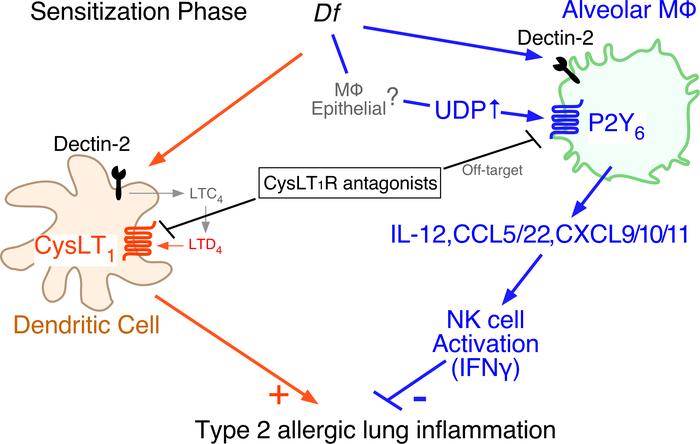Citation Information: J Clin Invest. 2019;129(12):5169-5186. https://doi.org/10.1172/JCI129761.
Abstract
Antagonists of the type 1 cysteinyl leukotriene receptor (CysLT1R) are widely used to treat asthma and allergic rhinitis, with variable response rates. Alveolar macrophages express UDP-specific P2Y6 receptors that can be blocked by off-target effects of CysLT1R antagonists. Sensitizing intranasal doses of an extract from the house dust mite Dermatophagoides farinae (Df) sharply increased the levels of UDP detected in bronchoalveolar lavage fluid of mice. Conditional deletion of P2Y6 receptors before sensitization exacerbated eosinophilic lung inflammation and type 2 cytokine production in response to subsequent Df challenge. P2Y6 receptor signaling was necessary for dectin-2–dependent production of protective IL-12p40 and Th1 chemokines by alveolar macrophages, leading to activation of NK cells to generate IFN-γ. Administration of CysLT1R antagonists during sensitization blocked UDP-elicited potentiation of IL-12p40 production by macrophages in vitro, suppressed the Df-induced production of IL-12p40 and IFN-γ in vivo, and suppressed type 2 inflammation only in P2Y6-deficient mice. Thus, P2Y6 receptor signaling drives an innate macrophage/IL-12/NK cell/IFN-γ axis that prevents inappropriate allergic type 2 immune responses on respiratory allergen exposure and counteracts the Th2 priming effect of CysLT1R signaling at sensitization. Targeting P2Y6 signaling might prove to be a potential additional treatment strategy for allergy.
Authors
Jun Nagai, Barbara Balestrieri, Laura B. Fanning, Timothy Kyin, Haley Cirka, Junrui Lin, Marco Idzko, Andreas Zech, Edy Y. Kim, Patrick J. Brennan, Joshua A. Boyce
Graphical abstract



Copyright © 2025 American Society for Clinical Investigation
ISSN: 0021-9738 (print), 1558-8238 (online)

